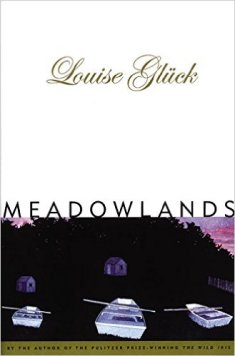Meadowlands by Louise Gluck
I went on a kick of reading everything Penelope-related. Anything that played with the Odyssey, I read it. Penelopiad by Margaret Atwood? check. Collection of modern Greek poetry by Katerina Anghelaki-Rooke? check.
HOW I missed Meadowlands by Louise Gluck is beyond me.  The book of poetry uses the Odyssey, and Penelope and Odysseus’s relationship, as a springboard for exploring power dynamics in relationships, love loss distance and growing apart, etc. They’re contrasted with a modern couple bogged down with the bitterness minutiae breeds. Ancient and modern, mythical and real, it’s all the same heart, so it’s all the same shit.
The book of poetry uses the Odyssey, and Penelope and Odysseus’s relationship, as a springboard for exploring power dynamics in relationships, love loss distance and growing apart, etc. They’re contrasted with a modern couple bogged down with the bitterness minutiae breeds. Ancient and modern, mythical and real, it’s all the same heart, so it’s all the same shit.
But of course the poems I liked the best were the ones that directly talked about the Odyssey. I thought “Siren” was a nice in-between. The siren is the woman who lures Odysseus in during his journey home, but in Gluck’s poem, she’s a distinctly modern woman. We’re not sure if this is a woman that Odysseus meets, or the unnamed male in the modern couple. Either way, though, it’s the voice of the siren that sticks with you. The humanizing of the “other woman.”
Siren
I became a criminal when I fell in love.
Before that I was a waitress.
I didn’t want to go to Chicago with you.
I wanted to marry you, I wanted
Your wife to suffer.
I wanted her life to be like a play
In which all the parts are sad parts.
Does a good person
Think this way? I deserve
Credit for my courage–
I sat in the dark on your front porch.
Everything was clear to me:
If your wife wouldn’t let you go
That proved she didn’t love you.
If she loved you
Wouldn’t she want you to be happy?
I think now
If I felt less I would be
A better person. I was
A good waitress.
I could carry eight drinks.
I used to tell you my dreams.
Last night I saw a woman sitting in a dark bus–
In the dream, she’s weeping, the bus she’s on
Is moving away. With one hand
She’s waving; the other strokes
An egg carton full of babies.
The dream doesn’t rescue the maiden.
***
Here’s a Penelope-centric one.
Penelope’s Stubbornness
A bird comes to the window. It’s a mistake
to think of them
as birds, they are so often
messengers. That is why, once they
plummet to the sill, they sit
so perfectly still, to mock
patience, lifting their heads to sing
poor lady, poor lady, their three-note
warning, later flying
like a dark cloud from the sill to the olive grove.
But who would send such a weightless being
to judge my life? My thoughts are deep
and my memory long; why would I envy such freedom
when I have humanity? Those
with the smallest hearts
have the greatest freedom.
I’m still thinking these poems through–poems where, as one reviewer said, “the ordinary becomes heroic”–but I loved these two in particular.



No comments:
Post a Comment